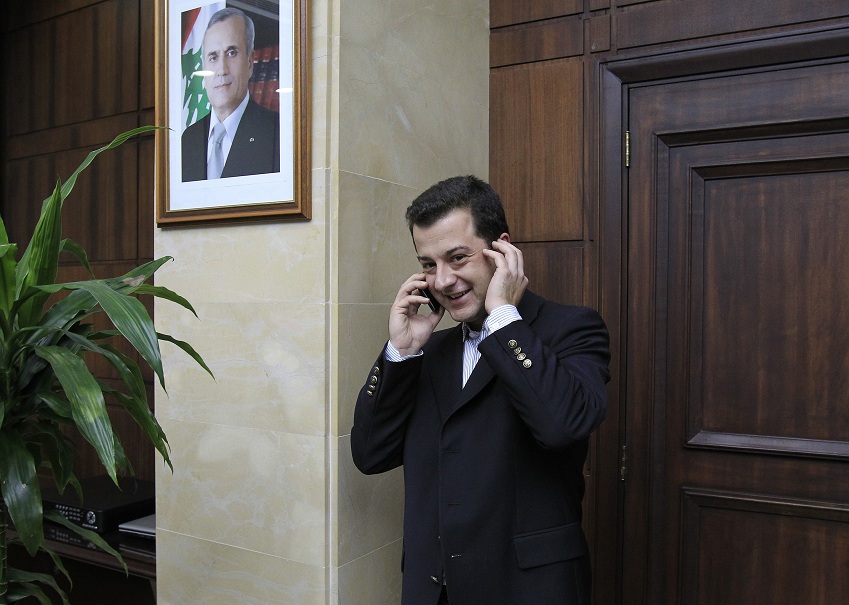CAIRO: Saad Al-Katatny, secretary general of the Freedom and Justice Party (FJP), was elected Speaker of the People’s Assembly (PA) on Monday, vowing to continue the revolution before thanking the ruling military council and the army.
"From this panel, we announce to the Egyptian people and the whole world, that the revolution continues," Al-Katatny said at the first session of Egypt’s post-Mubarak parliament, which was marked with tension and a few arguments.
He stressed the importance swift, just trials for those responsible for killing the martyrs during the 2011 uprising, as well as the need to build a new democratic Egypt.
"We will never betray the martyrs’ blood," he said, describing the assembly as a “revolutionary, Egyptian PA."
He got 399 votes out of 508.
Arguments broke out among the parliamentarians and Mahmoud El-Saqqa, the eldest MP who presided over the first session until Al-Katatny’s election.
"These tense moments are due to the fact that this is the first time for many of the MPs to participate in parliament," Diaa Rashwan, deputy head of Al-Ahram Center for Political and Strategic Studies who specializes in Islamist movements, told Daily News Egypt.
Two deputies are to be elected, one representing workers and farmers and the other professionals. The results were not announced by press time. The competition included Al-Nour’s Ashraf Thabet and Ayman Aboul Ela of the Democratic Egyptian Social Party for professionals, and Mohamed Abdel Alim Dawood of Al-Wafd Party and Abdel El-Nasser Abdel-Halim, independent candidate, for workers.
It is expected that Dawood and Thabet will win the seats as they are backed by the majority.
Last week, several parties including the Salafi Al-Nour Party agreed that the FJP, as the winner of the largest bloc in parliament with around 47 percent of the seats, should nominate the PA speaker, while Al-Nour, which came in second at about 25 percent, will nominate the first deputy.
The second runner up, Al-Wafd, which won 66 seats out of 498, would nominate the second deputy. Each party would be responsible for nominating its candidate.
Essam Sultan, leading member of Al-Wasat Party, Yousef El-Badry, an independent candidate, and Magdy Sabry of the Egyptian Bloc nominated themselves for the PA speaker seat against Al-Katatny. Sabry then quickly withdrew from the race and announced his support for Sultan.
Tensions rose when it was time to nominate the head of the PA, with Sultan arguing that the candidates, as initially suggested by El-Saqqa, should be given the opportunity to introduce themselves to the rest of the parliament.
Other MPs weighed in on the heated argument which put the session to a halt for around 10 minutes. El-Saqqa lost his temper a couple of times, shouting at Sultan to speak only when given permission.
"Whoever wants to continue speaking, can do it outside," El-Saqqa said at one point.
At the end El-Saqqa allowed the candidates to introduce themselves.
El-Badry, 32, said that even after Mubarak’s ouster, the new speaker of the parliament is assigned rather than elected, referring to Al-Katatny who was expected to win because he’s backed by the majority.
The elections were conducted through direct secret ballot. The winner had to secure an absolute majority.
"These tensions are a result of the ideological gaps and the polarization between the different blocs in the PA," said Mazen Hassan, professor of electoral systems in Cairo University.
The selection of the heads of the PA’s 19 committees is expected to take place on Tuesday.
The FJP issued a statement consisting of its nominations for the committee heads. The nominations comprise of nine FJP candidates and three affiliated with other parties and one independent. The rest of the committees are expected to be headed by Al-Nour and Al-Wafd parties.
The most prominent FJP candidates are Essam El-Erian for the foreign affairs committee, El-Beltagi for health, Saad El-Hoseiny for budget and planning, and general Abbas Mekheimar for defense and national security.
Councilor Mahmoud El-Khodeiry was nominated for the legislative affairs committee, Mohamed El-Sawy, head of El-Sawy Cultural Wheel and leading member of the Civilization Party, for culture, and Mohamed El-Sadat of the Reform and Development Party for human rights.
"It’s a good attempt by the FJP to give the opportunity to other parties to have leading positions in the PA," Rashwan said.
Hassan and Rahswan agreed that the rule of majority reigns in any PA.
Hassan explained that the heads of committees are responsible for leading discussion with the designated ministers and would have a role in managing sessions and approving laws.
Earlier in the day, tension arose when Mamdouh Ismail, MP for the Salafi Al-Asala Party, added to the official oath, saying he swore to respect the constitution and the law “as long as it does not contradict God’s law."
After a brief rebuke and requests to repeat the oath, Ismail did, saying at the end, “And to add a comment, ‘as long as it doesn’t contradict God’s legislation’."
El-Saqqa, who had repeatedly tried to diffuse the tension with humor, stressed that no discussion will take place in the first "procedural" session of the PA, until the speaker was elected, according to regulations.
Other Salafi MPs followed Ismail in his improvised oath. El-Saqqa responded by stressing that Article 2 of the constitution guaranteed that laws would be inline with Islamic legislation.
With Islamists dominating parliament, Rashwan said people shouldn’t get weary of the Islamists "so fast."
"Only around 15 MPs, representing 3 percent of the PA added this [religious statement] to their oath," he said.
"This percentage is very small and it’s normal that a free Egyptian parliament would represent different wings of the Islamists including the extremists and the more moderate," he added.
More liberal MPs including Mostafa El-Naggar and Ziyad El-Elaimy also added to the oath, saying they would serve the revolution’s goals and retrieve martyrs’ rights.
Other MPs with different affiliations wrote the additional statements in support of the revolution on a piece of paper that they held while swearing in.
Hassan said that some lawyers could use this improvised oath as grounds for questioning the legitimacy of the new PA.
"You can’t improvise in the PA’s oath, according to regulations," he said.
El-Saqqa said that any addition to the official oath would be scraped from the session’s minutes, according to article 287 of the PA bylaws.
Many of the MPs wore yellow sashes with the logo representing the No To Military Trials campaign, including political analyst Amr Hamzawy.
"Eventually, the MPs will have to grasp the rule of the game and realize that by making a fuss out of every little thing, they’re not only stalling sessions, but aggravating the people and the people won’t stand it," Hassan said.

Egyptian Muslim Brotherhood member of parliament Saad Al-Katatny, elected PA speaker, greets another MP during parliament’s first session. (AFP Photo/Asmaa Waguih/Pool)

